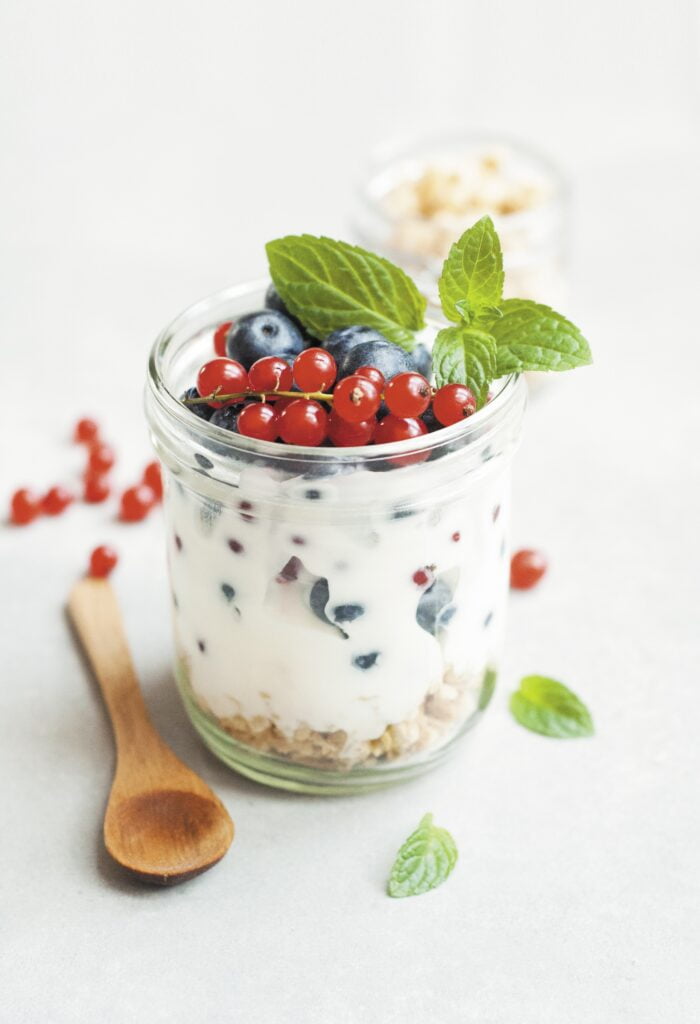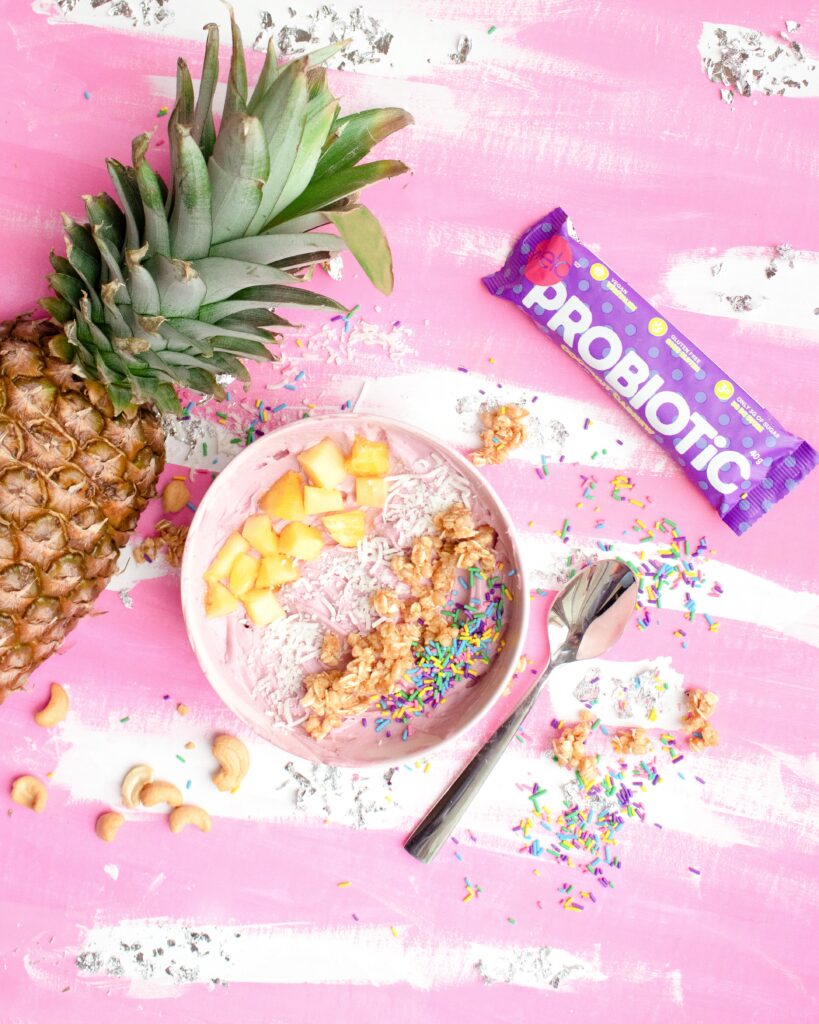Have you ever struggled to improve your child’s digestion? It can be more frustrating having dietary issues with children, as they are less likely to be interested in taking supplements. When it comes to your children’s health, there is nothing you won’t do to improve it though is there– and rightly so! In my experience, these things are all about trial and error whilst you uncover the best approach for your child.
For digestive issues, probiotics are excellent supplements packed with natural bacteria to support your digestive system and gut health. They can also be great for children, used in the right amounts and with a doctor’s advice.
NB: Before using these products, we advise checking with your children’s doctor. Probiotics are safe for children as long as they don’t have any issues with their immune system, cancer, or are a premature infant. In these cases, there is a risk of infection.
Let’s have a look at the best probiotics for children.
Olly Kids Multivitamin & Probiotic
The best way to get kids to take any medication is to make it fun and tasty. Olly Kids Multivitamin & Probiotic achieve this through their chewable gummies with a blend of vitamins and essential nutrients.
They include not just a strong probiotic strain, but also added vitamins A, C, D, E, and zinc. This makes them a strong combination for supporting your child’s growth and development.
The majority of customers using them love them. Olly are a great brand for probiotic supplements and it definitely looks like their children’s range lives up to the overall brand expectations. Thousands of reviews attest to improved digestion for children without side effects, bad taste or smell, or issues getting kids to take these.
Digestive Advantage Kids Daily
Digestive Advantage sell a daily gummy probiotic for kids, aiming to ensure everyday health for your children. Gummies come in jars of 80 in natural fruit flavours and contain the BC30 Bacillus coagulans bacteria, which survives stomach acid and improves end-to-end digestion.
Digestive Advantage claim that the BC30 bacteria helps to also support the immune system.
Overall, customers report children doing really well after taking these gummies, feeling stronger and having a regular digestion.
Culturelle Kids Packet Daily
Another daily probiotic supplement, Culturelle’s probiotics work on both digestive and immune systems for children. They are good for children from 1 year old and come in packets of 30 single servings.
Their probiotic strain is LGG, which has been proven in studies to form a strong barrier in the digestive tract, activating the body’s natural defences to protect against non-beneficial bacteria.
Unlike the previous two products, the Culturelle Kids Probiotics are soluble powder packets which make it easy to mix them into drinks or food. This makes them less noticeable and easier to take than even gummies.
Natural Food Sources Of Probiotics
While, ideally, you would like your children to get their probiotics from natural sources, it is true that these are not particularly attractive food options for kids. However, if your child tolerates them, try and add these into their diet:
Yoghurt
Yoghurt is probably the easiest natural source of probiotics for kids, as you can get flavours your child will like. Made from milk that has been fermented by friendly bacteria, yogurt includes good strains of probiotics. It is also a good source of calcium, contributing to bone health and development.
Finally, it is a known fact that yogurt helps children recover from diarrhea caused by antibiotics, as well as reduce Irritable Bowel Syndrome (IBS) symptoms.

Pickles
Pickled cucumbers (or gherkins) are fermented with their own naturally present lactic acid bacteria. This makes them a great source of probiotic. Associating pickles with tasty snacks such as hot dogs can make them more interesting to children. Besides, they have vitamin K and are low calorie.
The downside of pickles is that they have high sodium content, and that the taste may put children off.
Kefir
This fermented milk drink can be a good source of probiotics for children. Kefir grains – cultures of lactic acid bacteria and yeast – are added to milk to obtain the drink. This is actually a better source of probiotics than yoghurt and is also very well tolerated even by those who are lactose intolerant.
The main challenge with kefir is whether your child will like the taste. If they do, it’s a really easy way to supplement their diet.
There are many other natural sources of probiotics, such as sauerkraut, kimchi, miso, tempeh etc. Depending on your child’s tastes, you can consider trying these as well, but they may be less interesting to a child than the ones listed.
Probiotic Side Effects
For all their positive impact on our digestive system, probiotics can have side effects which it is important to be aware of before adding them to your child’s diet. Some of the key side effects of probiotics for children can be:
Digestive symptoms such as bloating and gassiness
Children may struggle with this and it can become painful. They are side effects caused by the body adjusting to the probiotic strain, so they may subside after a short while. However, if they carry on, you should check with your doctor.
Headaches caused by biogenic amines
These are present in probiotic-rich foods like yogurt, sauerkraut, and kimchi. They can excite the central nervous system, increase or decrease blood flow, and can trigger headaches for those sensitive to the substance. If you try to give your child foods rich in probiotics and they develop headaches, you can switch to probiotic supplements instead to avoid this side effect.

Increase in histamine levels
Some probiotic supplements contain bacterial strains that produce histamine inside the digestive tract. As a result, you may notice an allergic-like reaction. It is wise to consult with your doctor and check the ingredients in the probiotic supplements to see that they are not prone to triggering this.
Other side effects can include allergic reactions or intolerances, which are particular to each individual.
Final Thoughts
For your child’s health, probiotic supplements and probiotic-rich foods can work wonders for improving the digestive process and boosting immunity according to expert Alicia Harper.
While there are some excellent probiotic supplements on the market which help mask the taste and even the fact that they are taking a supplement, you should proceed with care when it comes to using probiotics for kids.
Check with your doctor and – if advisable – include one of the delicious supplements above with their meals to get great results.

